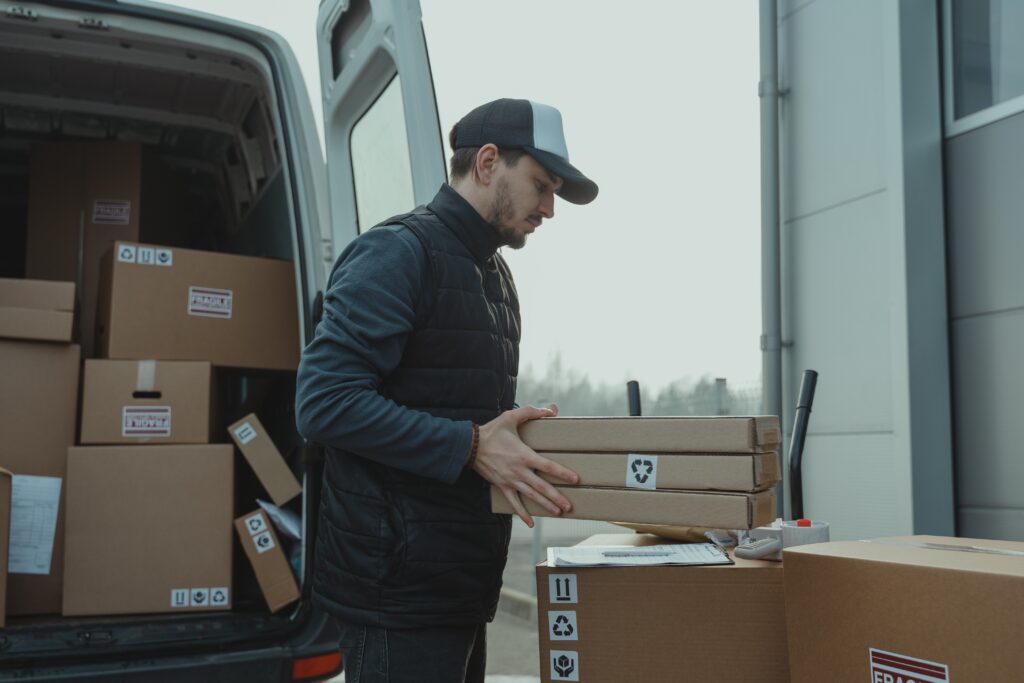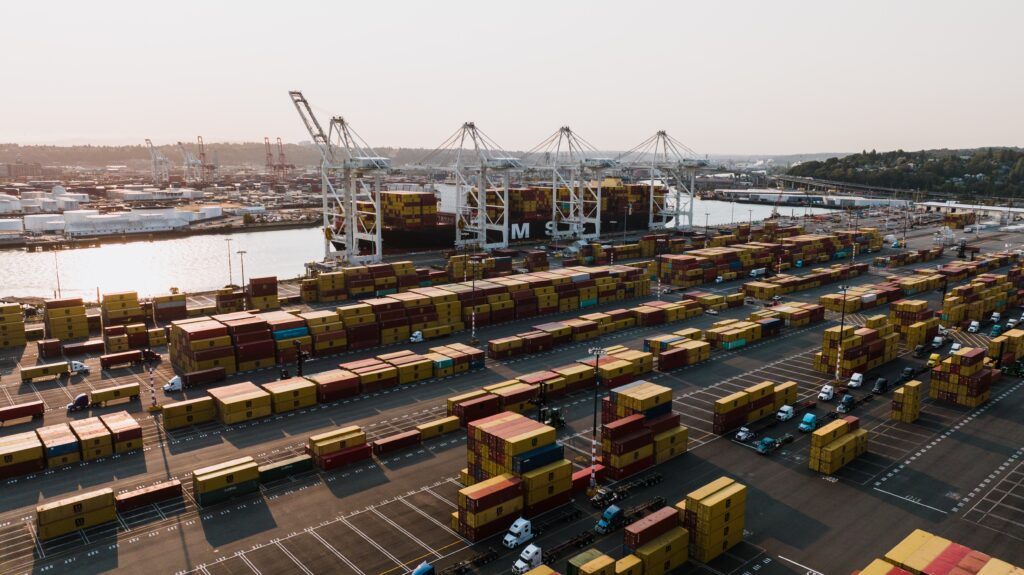Customer satisfaction is a significant concern for the majority of eCommerce businesses. However, nowadays, consumers expect a fast and efficient online service.
To meet these expectations, you must provide consumers with a desirable product and the appropriate shipment options.
Retail logistics operations assure a smooth procedure that involves everything from inventory management to shipment.
Logistics in the retail business are vital for the company to succeed and become profitable. In this blog, we will discuss the role of logistics in the retail industry and how essential it is for businesses to have a sound retail logistics management system.
What is Retail Logistics?
Retail logistics covers all inbound and outbound operations that result in the flow of completed items from a company to the end consumer. A solid retail logistics plan must optimize to run a sustainable direct-to-consumer (DTC) retail operation.
There are five main components to retail logistics solutions:
- Inventory management: This process is responsible for organizing and tracking inventory levels and predicting future needs.
- Transportation management: This component plans and executes the transportation of goods to and from retail locations.
- Warehousing: This manages inventory storage in a company’s warehouse(s).
- Order fulfillment: This handles the packing and shipping of orders to customers.
- Returns management: This manages the return of goods from customers to the company.

How Retail Logistics Works?
Retail logistics aims to ensure that customers receive the correct items they ordered on time and without issue. So, businesses need a well-oiled machine to manage transportation, warehouse management, and order fulfillment.
Purchasing Inventory
Purchasing inventory helps businesses avoid the unavailability of products when needed. Merchandise is supplied through procurement to satisfy demand on time. An effective buying procedure is the first step toward successful logistics in the retail industry.
Inventory Receiving and Processing
After the merchandise procures, it must be received, unpacked, and processed before it can store in the warehouse. It involves quality control to ensure that the products meet the standards set by the company.
Inventory Distribution
The next step is getting the supplier’s inventory to the retail locations. You can transport goods in many ways, including by truck, train, ship, or plane. A logistics partner with access to various warehouses may save you time and frustration by making this part of retail logistics easier and faster.
Order Fulfilment
After a customer orders, we ensure the product is ready to be shipped. Order confirmation emails, which include facts about the order consumers wish to see, might be sent depending on the business.
Inventory Management
Inventory management and tracking are crucial parts of the logistics industry. This stage is critical in assisting businesses in keeping track of changing inventory levels and the need to replenish. By tracking inventories, you may also track orders while simultaneously time, monitoring them to provide your customers with shipment updates.
Orders for Delivery
Inventory is sent to distribution hubs far too quickly for products to be sent to customers. Shipping is one of the most essential but tricky aspects of logistics. It is because several things might go wrong during shipment, including delays, item loss, delivery to the wrong address, and even damage.
Returns Management
If you want your business to run smoothly, YOU MUST manage returns correctly. Companies that do not have a working return policy will lose money and consumers.

The Impact Of Covid-19 On The Retail Industry
The COVID-19 pandemic has forced businesses in the retail industry to change the way they operate. Many retailers have temporarily closed their doors, while others have had to pivot to online-only sales. The pandemic has also decreased consumer spending, as people are buying only essential items.
The pandemic has impacted the logistics industry immensely. With so many businesses closed, there is less demand for transportation and warehousing services. Many logistics providers have had to lay off workers or reduce hours.
How the Retail Industry Benefits from Logistics
Retail and logistics companies are linked together in a symbiotic relationship. Logistics has a direct impact on retail businesses and their customers. Here are eight ways that logistics affect the retail industry:
1. Logistics Manages And Streamlines The Supply Chain
The retail industry benefits significantly from streamlined supply chain management. By working with a logistics partner, businesses in the retail industry can streamline their supply chains and make them more efficient.
2. Logistics Ensures That The Product Is Delivered To Retail Stores On Time
Another role of logistics in the retail industry is that it enables businesses to get their products to consumers quickly. Consumers expect to receive their orders quickly and without delays in today’s fast-paced world.
3. Logistics Provides the Most Innovative Technology
Logistics providers are always looking for ways to improve their services with the latest technology. It helps retail businesses stay ahead of the competition and offer their customers the best possible experience.
4. Logistics Provides Excellent Inventory Management
Another role of logistics in the retail industry is inventory management. Logistics providers have the tools and technology to help businesses track their inventory levels and always have the products their customers need in stock.
5. Logistics Helps Companies to Save on Transportation Costs
Logistics can also help businesses in the retail industry to save money. By working with a logistics provider, businesses can take advantage of economies of scale and get discounts on transportation and other services.
6. Logistics Manages Returns efficiently
Easy returns management is one of the retail industry’s most significant roles in logistics. Returns are a part of doing business, but they can be a hassle for businesses if they do not manage properly. Logistics providers can help businesses to streamline their return process and make it easier for their customers.
7. Logistics Reduces the Risk of Damaged Products
Retail businesses can also reduce the risk of fraud by working with a logistics provider. Logistics providers have the tools and technology to track shipments and deliver them to the correct address. It can help to prevent fraud and protect businesses from losses.
8. Logistics Helps Improve Customer Experience
Lastly, businesses in the retail industry can improve their customer experience by working with a logistics provider. Logistics providers can help businesses to deliver their products on time and provide customer support if there are any issues with an order. It can help build customer loyalty and keep them returning for more.

Common Challenges in Logistics Management in Retail Industry
Here are some of the most typical issues that businesses encounter in the retail industry when it comes to logistics:
- Lack of visibility across the supply chain
- Inefficient transportation management
- Lack of technology integration
- Fragmented communication
- Returns management
- Poor inventory management
- Lack of customer focus
- High transportation costs
7 Things to Consider to Improve Retail Logistics Management
The retail industry is under immense pressure to meet the needs of customers. To guarantee that items are delivered on time, and as expected, an efficient and reliable logistics operation is required. Here are seven things to consider to improve retail logistics management:
1. Experts should be hired to manage logistics.
Retail logistics is a vital part of any eCommerce organization that assists businesses in achieving high levels of client loyalty. Regardless of the size of your company, collaborating with a 3PL with retail logistics experience like Hopewell Logistics is a better option.
A logistics partner will manage the complex parts of your retail logistics, allowing you to spend and focus more time on other areas of your business.
2. Choose your tech stack wisely
You may do more in retail logistics by utilizing cutting-edge technologies. Integrating your retail logistics with an automated logistics software stack may save much of your time. These might be as basic as clickable marketing platforms, return icons, or other automated logistical solutions that make the procedure as simple as possible.
3. Don’t be afraid of digital logistics
In the digital world, there are no limits to what you may do in retail logistics! You choose a better digital experience over keeping with traditional retail logistical operations. You may optimize retail logistics by combining data analytics, artificial intelligence, and other dependable software to get a competitive edge.
4. Approach your RFP process with an agile mindset
When evaluating retail logistics providers, remember to make your RFPs as precise and specific as possible. By having a pre-planned RFP, you’ll be able to assess retail logistics providers more quickly and accurately.
5. Diversify your global shipping and import strategies
Be strategic about the countries you’re shipping to and from. If you can, consider using a 3PL that has a worldwide network. It will help you to reach more customers and ship products more efficiently.
6. Plan fulfillment center locations based on inventory needs
Always consider your inventory needs when determining where to locate your fulfillment centers. You’ll want to have your products close to your customers to minimize shipping times and costs.
7. Think about return management year-round
Returns are a part of retail logistics, so you’ll want to plan for them accordingly. Have a return management strategy in place to handle returns quickly and efficiently.

Retail Logistics Trends this 2023
What does the future of retail logistics look like? Keep your eye on these seven trends in 2023:
Hybrid and omnichannel customer journeys
Online shopping is highly convenient since it can be done anywhere and anytime, allowing us to access almost anything without leaving our homes.
To meet the needs of both shoppers, retailers must provide a hybrid or omnichannel customer journey. It means having a seamless experience between online and offline shopping so that customers can shop how they want when they want.
Elevating supply chain executives to the C level
The role of the supply chain is becoming increasingly important as businesses strive to meet the needs of their customers. Many experts believe the supply chain will become the most critical driver of competitive advantage in the next decade.
Integrating flexible contracts
In the past, businesses often signed long-term contracts with third-party logistics (3PL) providers. However, this is starting to change as companies demand more flexibility from their logistics partners.
Increasing inventory reserves
Inventory management is a crucial part of retail logistics. In the past, retailers often kept very little inventory on hand to save on costs. However, this is starting to change as retailers realize the importance of having inventory reserves.
Conscious consumers continue to define retail habits
Consumers are becoming increasingly conscious of their purchases’ impact on the environment and society. It is causing them to change their shopping habits and has a significant impact on the retail industry.
AR, VR, and the metaverse drive immersive, experiential shopping
Augmented reality (AR), virtual reality (VR), and the metaverse are all starting to change how we shop. These technologies allow us to have an immersive, experiential shopping experience, unlike anything we’ve ever seen.
Cashless, contactless, and autonomous shopping and delivery
As technology advances, we shift towards cashless, contactless, and independent shopping and delivery. It is made possible by blockchain, the internet of things (IoT), and artificial intelligence (AI).
Investing in supply chain agility
Supply chain agility is becoming increasingly important as businesses strive to meet the ever-changing needs of their customers. Agile companies must be able to respond swiftly to market developments and make real-time decisions.
Investing in customer experience
Investing in customer experience is becoming increasingly important as businesses strive to differentiate themselves in the market. Customer experience can be enhanced by AR, VR, and the metaverse.
Improving supply chain forecasting
Forecasting is a crucial part of retail logistics. To meet the needs of their customers, businesses need to be able to forecast demand accurately. It can be done through the use of data analytics and machine learning.
Maximize Logistics Management in the Retail Industry with Hopewell Logistics

The retail industry is ever-changing, and businesses need to be able to adapt quickly to stay ahead of the competition. Hopewell logistics can help businesses in the retail industry streamline their supply chains, improve their customer experience, and reduce costs. We would love to help you grow your business! Our professional and personal team offers an array of services that can customize for your company.
Hopewell Logistics as Your Retail Industry Partner
Logistics management is a vital part of the retail industry. By working with a logistics partner, businesses in the retail industry can streamline their supply chains, improve their customer experience, and reduce costs. With Hopewell Logistics, businesses can benefit from our wide range of services designed to meet your business’s specific needs.






